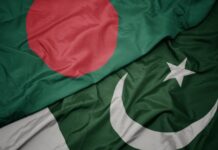Pakistan’s way of suppressing the voices of dissent violently was once again demonstrated, after the law enforcement agencies of Pakistan on Sunday launched a brutal crackdown against a demonstration organised by the family members of late Sindhi social activist Hidayat Lohar.
After Dr Mahrang Baloch, a young Baloch doctor who had taken on the might of the Pakistan military early this year, it is the turn of daughters of a prominent Sindhi intellectual and activist, Hidayat Lohar, who was killed by security agencies last month. His three young daughters, Sorath, Sarang and Sasui, were on the road, blocking the Nasirabad Highway, demanding an FIR.
Sasui Lohar and Sorath Lohar are the founders of the Voice of Missing Persons of Sindh, an organization aimed at supporting victims of enforced diappearences and their families to seek justice.
The police refused to accept their demand and the sisters were leading a street protest demanding action against those who killed their father, Hidayat Lohar but now they have been arrested.
WHO IS HIDAYAT LOHAR?
Hidayat Lohar, a well known intellectual and activist, had been on the target of security agencies for long. In 2017, he was abducted by security forces and released two years later after his daughters fought tooth and nail. A veteran teacher, Lohar has been active in Sindh politics and often fell foul with the military establishment.
On 16 February, Hidayat Lohar was assassinated by two unidentified gunmen who shot him while he was traveling to work. Such targeted killings have become a favourite weapon of the army and police forces to eliminate popular ethnic leaders. Dr Mahrang Baloch’s father too had met a similar fate. Several thousand others too have been `disappeared` by the security forces over the years.
BRUTAL CRACKDOWN AGAINST SINDHI ACTIVISTS NOW A REGULAR FEATURE
This is not the first time that Sindhi activists have been targeted by security forces and agencies. Last year, in September, Pakistan Rangers, a para-military force led by Army officers, killed at least four Sindhi villagers and injured nine others in Sakrand village. The local community was enraged by this targeted killing and said the villagers were shot only because they had protested the high-handedness of the security forces. The Rangers, on the other hand, countered that the killed villagers were members of a Sindhi militant group. No one knows the truth even though the then Interim Chief Minister had ordered an inquiry into the incident.
The murder of Hidayat Lohar has spread a wave of anger in the Sindhi community. His daughters have since his death been on the street demanding action from the government but the police continue to stall any request to file the First Information Report. The daughters refused to budge unless police filed an FIR and investigated the murder of their father.
In their support, sporadic protests have broken out in other parts of Sindh. In Karachi, protesters argued that forced disappearances, and extrajudicial killings of political activists and innocent citizens have turned the country into a lawless state where no respect for human dignity exists. They pointed out how Dr Mahrang Baloch and her community had been squatting in Islamabad seeking return of their loved ones who were forcibly taken away by security forces without any formal charges. Amnesty International has called for an independent, impartial and prompt investigation into the killing of Lohar.
With the state refusing to pay heed to the cries of Sindhis, the protests by Lohar family was likely to turn into a major headache for the new government. The Baloch are already on the street and now the Sindhis. The people of Gilgit Baltistan have been protesting for long time over wheat and power issues. The Pashtuns are angry with the state over many issues, mainly for treating them as terrorism suspects and at the same time imposing Talibaization on their population. The entire ethnic population of Pakistan today feel marginalised by the state, as the Baloch have been feeling for decades.
